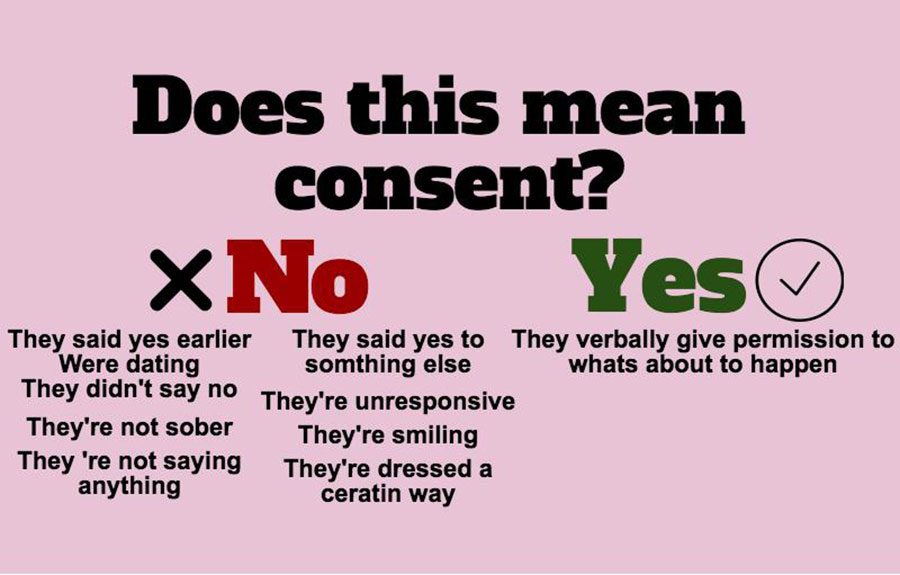Consent is not optional
Many people have varying ideas of what consent actually is, and don’t realize that the only thing that counts as consent is a verbal agreement to what’s about to happen. Here is a concrete list of what is considered consent and what isn’t
November 30, 2016
It shouldn’t be an argument, it shouldn’t be under discussion, consent is a basic human right that all people should be entitled to. Consent isn’t just for sexual or romantic relationships, it’s important in any physical interaction. Whether it be a hug, a pat on the back, or even something as innocent as a high five all parties must be voluntarily comfortable with having that interaction.
As teenagers it’s important that we understand and follow the basic rules of consent, especially at a time where many people are experimenting with and expanding their sexuality it’s very necessary to understand the dos and don’ts of sexual interaction.
First off what is consent? Consent is the mutual agreement between two or more people who are about to engage in a certain activity that all participants are voluntarily agreeing to do. In basic terms it just means that you and another person are doing something that you both have agreed you want to do. This usually means starting out with a conversation, making sure anyone involved in the act is fully aware of what’s going to happen, and comfortable with that.
It’s also important in high school to understand that many of us are underage, and in the state of Minnesota you are not always able to consent to your own sexual acts. No matter the age of the other person in Minnesota it is always statutory rape if one participant is under the age of 13, even if they are consenting. If the person is between age 13 and 16 they are able to consent if their partner is at most four years older than them. Consent laws often vary by state. In Minnesota if both parties are above the age of 16 the age difference doesn’t matter, but that doesn’t mean you don’t need consent. No matter your age, relationship with your partner, or prior sexual activity you will always need consent.
South High’s GECO, Gender Equity Collective, has decided to tackle the issue of consent in our school in a much more hands on matter. The group will be leading several consent workshops for our freshman class this year to provide them with a solid definition of what consent is and why it’s important. Claire Riggins one of the three leaders in the group describes why they felt for a consent workshop, “Well it came up around last year and I had just heard from a friend who has like a sibling who was in middle school that this grade of freshman had across the city had had some issues with consent and sexual assault.
There had been a lot of cat calling and unwarranted touching, and I was thinking how can we change that, we could you know have a workshop for the freshman, and originally it was going to be at freshman orientation, but it didn’t really work out and now we’re going to go into classrooms and do it with freshmen.” Another GECO leader Reya Jones mentioned that “freshmen are a part of the big problem where they don’t know what consent is,” adding that “not complying with consent is a really disrespectful thing and it can really hurt a person emotionally and it’s something they can take with them for the rest of their lives.”
And many people who have experienced varying types of sexual assault do have to carry that with them the rest of their lives. According to RAINN, The Rape Abuse & Incest National Network, 1 out of every 6 american women, and 1 out of every 10 american men, have been the victim of either attempted or completed rape, and 94% of people who have been raped experience PTSD (Post Traumatic Stress Disorder) in the first two weeks after. And 69% of sexual assault victims are under the age of 34. When thinking about rape or sexual assault it’s easy to picture a random stranger who attacks people in dark alleyways, but the truth is 43% of sexual assaults are perpetrated by someone known by the victim. Which is why it is so important that in any scenario both parties get consent from their partners.
“I think consent is having a conversation between people about what’s okay and what our mutual shared agreements are, and I think a lot of times we as a society don’t develop skills of effective communication or respective communication,” GECO leader Grace Sommers explains, “and if we don’t start teaching [consent] then it will never become a part of our society and it will never become an expectation for people.” GECO hopes to spend at most two days covering all the freshmen social studies classrooms before winter break.
Riggins explains how they’d like to start off with: “a basic slideshow busting myths about what consent is and isn’t and then some definitions and statistics of consent,” following it up with a fun: “red light green light game,” where the GECO team will: “set up a scenario then have people move to whichever part of the room they think the consent is, red being its not consent, green being that is consent, and yellow being I’m not really sure.” Riggins then hopes to follow it up with the educational quiz game Kahoot. With prizes and candy the game makes for a fun way to teach students about the basics of consent.
And why shouldn’t consent be fun? It’s a fun and safe way for people to do things they like with people they like. Yes consent is a must when it comes to sexual interaction, but it’s also an exciting way to feel comfortable, and communicate with the person you’re with. And if you’re ever feeling unsure about someone’s ability to consent, or whether not they are consenting, remember that yes means yes, and no means no, if it still isn’t clear to you at that point then you do not have consent and you need to stop, consent isn’t optional it’s mandatory.






